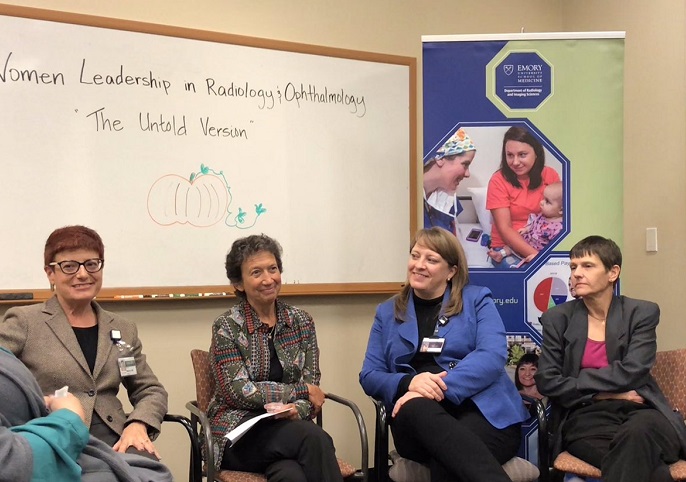Women Leaders Share Wisdom and Experience
Jan. 31, 2018

On October 24, “Women Leadership in Radiology - The Unpolished Version,” organized by Dr. Nadja Kadom, associate professor and director of pediatric neuroradiology, was held in Calhoun Auditorium and Learning Resource Center. Nearly the entire auditorium was filled with women from both radiology and ophthalmology who had come to hear women in the leadership roles they may aspire to one day share their experiences and secrets of success.
Faculty leadership panelists included Carolyn Meltzer, MD, chair of the Department of Radiology and Imaging Sciences; Nancy Newman, MD, director of neuro-ophthalmology at the Emory Eye Clinic; Deb Smith, MBA, chief academic business officer for Emory Radiology; and Elizabeth Krupinski, PhD, vice chair for research for Emory Radiology.
Laura Benson, manager of clinical operations, served as the panel’s moderator and host. She explained the event was “meant to be the unpolished version of their leadership stories and what pearls they can share.” She spent ten minutes with each panelist asking prepared questions, followed by a rapid-fire round. Afterwards, the panel opened for questions from the audience, which was largely filled with young female faculty members and trainees.
The prepared questions addressed the panelists’ personal experiences, from childhood memories and popularity in high school to their lasting relationships with spouses both in and outside the medical field and how they balance motherhood with career aspirations.
Benson then asked them about their leadership styles and how they encourage more women to become leaders in their fields.
Dr. Meltzer described her role as a leader as “conforming enough to get in positions where you can change organizations and cultures for the better...finding that balance between being tempered and then a bit more of a radical, questioning and moving things forward.”
Dr. Newman, who hasn’t felt a need to pursue traditional leadership roles in her field said, “I want to encourage women to be leaders, but I don’t want to encourage them to do something that doesn’t fit their personality and what’s really going to make them happy.”
When the conversation moved to articulating the most important leadership skill that everyone should have, Smith’s answer was emphatic: imagination. “That’s closely tied to empathy, which is the ability to imagine something that’s not your own experience...Be imaginative and then other things will follow: being able to communicate with others, interact with others, and effect change, things like that will follow.”
Next, each panelist spoke about her experiences with mentorship, both as mentees and being mentors for others. Despite being in a traditionally male-driven field, they found they had a mix of both men and women as mentors.
When mentoring women themselves, every panelist stressed to their mentees the importance of self-promotion. They agreed that many of the women they mentor have to learn and make a conscious effort not to underplay their own accolades and accomplishments. Instead, they need to work to find opportunities to self-promote comfortably, which they concede is often easier said than done.
Dr. Krupinski shared her experience with learning this. She found that often being the only woman on the research team was “instructive...it taught me how to really promote myself in a group of men...even the number of female students was always very low. So, it taught me to be able to one, promote myself, and two, stand up when I felt something was going wrong.”
Finally, the panelists spoke on dealing with sexism and misogyny in the workplace, which they feel has taken positive strides since they began their careers. Dr. Meltzer emphasized the importance of facing these types of situations and speaking out rather than letting them simmer, helping everyone to learn from them.
Dr. Krupinski echoed her sentiments, saying it can feel “incredibly negative, but you have to be able to turn it around when you can.”
To end the session, Benson began the rapid-fire round of questioning, using the Proust Questionnaire. She asked, “Where would you like to live?” Answers included “On the beach” and “Colorado.”
“What is your idea of earthly happiness?” Responses included “Fulfillment” and “human connection.”
“What’s your guilty pleasure?” Rapid responses were “Chocolate” and “Cold Stone Creamery.”
Following the formal panel, audience members asked the panelists their own questions, both about leadership in general and advice for their own situations. Afterwards, many attendants stayed to for more personal discussions in small groups.



